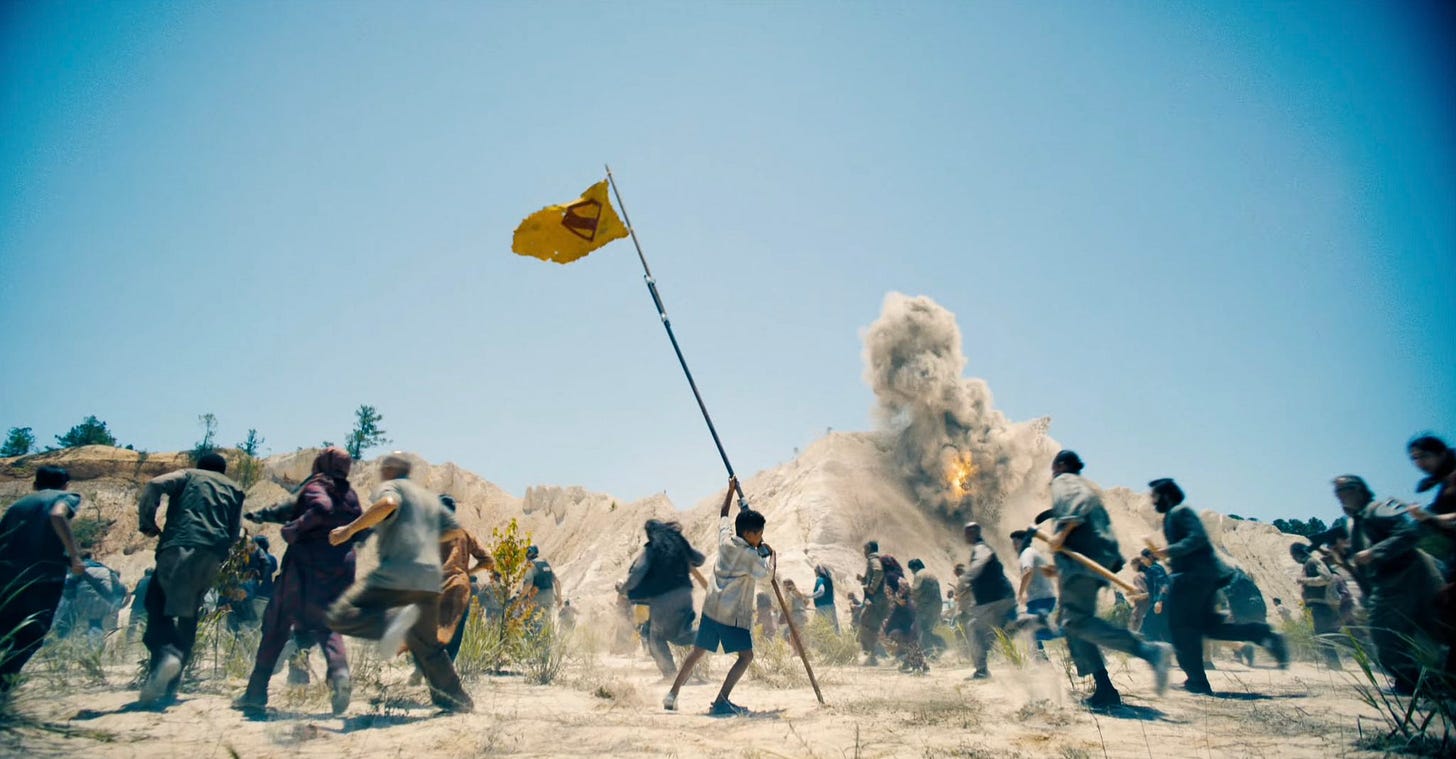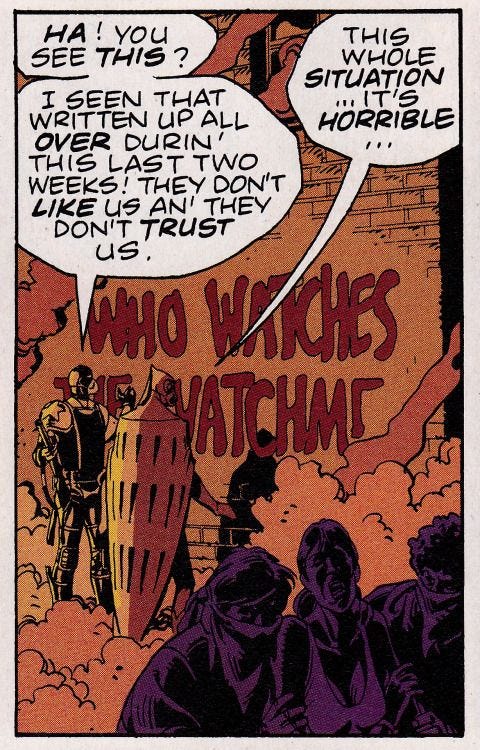Spoilers for Superman(2025) , if that’s something you care about
Somebody saaaaaaaave meeeeee……..
It can very well be argued that the mythos of our current era can be defined by the stories we tell with the idea of the “superhero”- gods amongst men, who arrive at the Nick of time to save us helpless mortals. Often, they are beings meant to symbolize something within us-to give us reason to hope for a bright future. This is the core of what writer Jerry Siegel and Joe Schuster had in mind when they created Superman in 1938. The superhero is not just an idea, but an ideology-something to aspire to. Superman may be an alien being with a surprisingly Christ-like origin for two Jewish authors, but his very purpose is to represent the very best of humanity, the pure symbol of hope and justice. He was created during the peak of the second World War, when hope was needed in the face of one of the greatest evil mankind had seen to date.
It is only apt that the current rendition of the on-screen Superman would try to tackle this theme head-on. It is not hyperbole when people say that Superman(2025) is anti-Israel; it is so explicit with its intentions from the very opening words. The film introduces the fictional country Boravia as the US’ strongest ally, to whom we also sell arms to. Boravia had tried to invade and occupy its neighboring country, Jarhanpur, which had been stopped by none other than Superman himself by flying Boravia’s prime minister to the desert and sticking him to a cactus. While Superman effectively stopped a war, he becomes a face of controversy-after all, he acted on his own accord in geopolitical conflict without any approval from the US military, or any other governing power, reasonably concerning many. After all, if you cannot control something with that much power, what’s to stop them from coming for you?
I’ll argue every adaptation and continuation of Watchmen is actually not good, including the admittedly cool HBO show
Ever since Alan Moore penned Watchmen, comic writers have tried to find ways to justify the existence of superheroes in an increasingly grey world. Moore himself views the popularization of the genre as inherently fascist; the very idea of ultimate, ungovernable power is indeed an aspiration of every fascist after all, and nearly every dictator has gained that power due to a populace unable or unwilling to challenge their rise. There is a valid reason to fear the idea of the Ubermensch. Superman, when written well, interacts with and often counters this idea: What if you had all the power in the world, and chose to use it for good?
The thesis of Superman(2025) plays with this inherent tension. When pressured by reporter (and lover) Lois Lane as to why he interfered with military action, Superman responds clearly and passionately that people were going to die. He had to act, because no one else would. Here is a man who lost his home before he could even learn what or where his home was, seeing the same thing happen to a comparatively defenseless people. It’s really not subtle, Boravia’s leader even sounds like Netanyahu.
As the final battle of the film commences, Boravian troops line up on the edges of the border, beginning their attack. Thousands of brown people amass with machetes and improvised weapons, ready to defy their occupier. A group of children hastily fasten together a flagpole with Superman’s symbol upon it, chanting his name-first in hushed whispers, which then quickly grow into a crowd-wide chant. This scene was one of the standouts in the trailer, and even in seeing it then I was a little thrown off. Due to multiple schemes by All-Time Hater Lex Luthor, Superman cannot stop Boravia this time. Amidst the tanks and gunfire and the crowds of fearful civilians (did I mention this film really hates Israel?), a child remains with the flag, chanting Superman’s name, almost like a prayer.
It’s very clear what James Gunn was going for here, but something about it just… didn’t feel right. Ultimately, other heroes come just as a BOF(Boravian Occupation Force) soldier tries to shoot the child (did I mention this film literally says Death to Israel?) and the day is saved, Top Five Comic Character Hawkgirl swoops in to grab (not)Netanyahu and drop him from the sky. The day is saved thanks to three very powerful Americans.
I cannot wait for this scene to drop so I can rewatch her dropping this man over and over again
Now listen, I won’t try to over-analyze this scene. I’m not the first to point out the inherent flaws of superheroes in general, nor am I here to say these stories are unimportant. It is incredibly fascinating that one of the most popular films of the year, what will most likely be the highest grossing film of the year, has a such a strong stance and message. However, Superman(2025) left me a little disappointed-not with the movie itself, which I did indeed enjoy, but with the genre overall. I wonder with so many narratives what general audiences get out of them- like it or not, every story does indeed have a message, and every person taking in that story has an opinion based on their lived experience.
A film in particular has so much potential to influence the mind as a visual, audible medium. American audiences in particular generally interact with specific types of films regularly- it is rare for most Americans to even have the capability to interact with foreign films, let alone care enough to watch them given the chance. This is not necessarily a slight against American audiences (though do we deserve mercy really?), simply an observation. Thus, the medium of film is more considered entertainment, “content” than any other medium. Audiences are getting that Israel is being called out here, but what will that long-term impact be? The issue is being discussed, but is the underlying solution presented as well? The brown people are not depicted as entirely helpless, but ultimately their situation is. Audiences see the connection because daily, they are shown the suffering of Palestinians by Israel’s hand. They are depicted in general media either as “noble savages” pleading for the violence to end, or simply as “savages” who dare to fight back and must then be executed without mercy. The superhero genre’s solution, every time, is not to empower the people to fight back themselves, but to have Big Damn Heroes swoop in and do the work. It is a very liberal-minded solution, and when faced with the reality that those Big Damn Heroes are not coming to save the Palestinians, or the Sudanese, or the immigrants against a certain organization that is currently putting all that criticize them on a list, it makes for a very depressing thought: No one is coming.
That’s right, this Superman essay is actually about Andor. Can you believe this show makes you empathetic towards the French?
On the other hand, another surprising piece of pop culture this year does indeed promote the necessary solution, so much that it’s been radicalizing its own fanbase (who truly should have already been there considering George Lucas’ own words): Star Wars’ Andor. Andor not only presents an occupying force and the leftist infighting getting in the way of dismantling it, it also presents the impact of people who refuse to sit on the sidelines and take liberation into their own hands, by any means necessary. it explicitly calls the actions of Empire genocide, displays the dangers of complicity and how accepting the comforts of Empire will only lead to your ruin, it even has an example of manufactured consent being put into the media to justify brute force. Director Tony Gilroy has admitted to being very interested in how revolutions form, particularly the Russian and Haitian Revolutions. Season one was partially inspired by The Battle of Algiers, a film depicting the real-life struggles of Algerian revolutionaries against French occupation. Star Diego Luna himself had been involved with the Zapatistas as a boy, and has often stated the importance of remembering the love it takes to keep a revolution going. It has a very clear message on who will bring liberation to the oppressed: the People, United. Superman embodies the hope an individual can have, and the selflessness an individual can strive for. While that is important, what we also need are stories to help us remember that we cannot defeat these great evils alone. Where there is hope, there must also be love.
You know who would make a great Wonder Woman?
It is a very interesting time for mass media. The mythos is being redefined once again: actors from both projects have been outwardly pro-Palestine, and those numbers are growing in Hollywood. Does this mean the tide is officially turning? And if it does, what does that actually mean in terms of real-world effect? I am still very cynical as to whether or not Americans en masse will see what must be done, but one thing is clear: currents are shifting. Slow is the shift, but it is noticeable.
Can I recommend Superman(2025)? Sure, it’s fun! I’m gonna watch the Soderbergh Che movies and hope they’re good. Recommend me some good comics to read so I can believe in the superhero genre again(yes, I’m going to read All-Star & Absolute Superman). Consider reading No Spiritual Surrender: Indigenous Anarchy in Defense of the Sacred by the late Klee Benally. Also consider, if it's available near you, watching To a Land Unknown, a film by and about Palestinians currently in select theaters.
Free Palestine.
See you in the Void,
James I.









